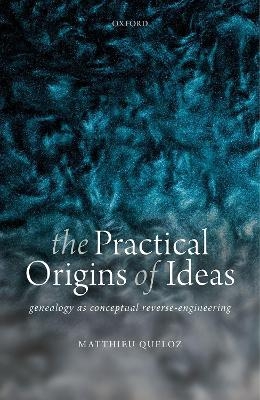
The Practical Origins of Ideas
Oxford University Press (Verlag)
978-0-19-886870-5 (ISBN)
This is an open access title available under the terms of a CC BY-NC-ND 4.0 International licence. It is free to read at Oxford Scholarship Online and offered as a free PDF download from OUP and selected open access locations.
Why did such highly abstract ideas as truth, knowledge, or justice become so important to us? What was the point of coming to think in these terms? In The Practical Origins of Ideas Matthieu Queloz presents a philosophical method designed to answer such questions: the method of pragmatic genealogy.
Pragmatic genealogies are partly fictional, partly historical narratives exploring what might have driven us to develop certain ideas in order to discover what these do for us. The book uncovers an under-appreciated tradition of pragmatic genealogy which cuts across the analytic-continental divide, running from the state-of-nature stories of David Hume and the early genealogies of Friedrich Nietzsche to recent work in analytic philosophy by Edward Craig, Bernard Williams, and Miranda Fricker. However, these genealogies combine fictionalizing and historicizing in ways that even philosophers sympathetic to the use of state-of-nature fictions or real history have found puzzling. To make sense of why both fictionalizing and historicizing are called for, this book offers a systematic account of pragmatic genealogies as dynamic models serving to reverse-engineer the points of ideas in relation not only to near-universal human needs, but also to socio-historically situated needs. This allows the method to offer us explanation without reduction and to help us understand what led our ideas to shed the traces of their practical origins. Far from being normatively inert, moreover, pragmatic genealogy can affect the space of reasons, guiding attempts to improve our conceptual repertoire by helping us determine whether and when our ideas are worth having.
Matthieu Queloz is a Junior Research Fellow at Wolfson College and Member of the Faculty of Philosophy at the University of Oxford. Before that, he completed a PhD at the University of Basel and an MA at the University of Zurich. His articles have appeared in journals such as Mind, Philosophers' Imprint, The Philosophical Quarterly, and Synthese. He received the 2020 Lauener Prize for Up-and-Coming Philosophers.
Acknowledgements
1: Why We Came to Think as We Do
2: The Benefits of Reverse-Engineering
3: When Genealogy Is Called For
4: Ideas as Remedies to Inconveniences: David Hume
5: A Genetic History of Thought: Friedrich Nietzsche
6: Loosening the Need-Concept Tie: Edward Craig
7: The Uses of Intrinsic Value: Bernard Williams
8: A Political and Ameliorative State of Nature: Miranda Fricker
9: The Normative Significance of Pragmatic Genealogies
10: Ideas Worth Having
Bibliography
Index
| Erscheinungsdatum | 05.05.2021 |
|---|---|
| Verlagsort | Oxford |
| Sprache | englisch |
| Maße | 160 x 240 mm |
| Gewicht | 572 g |
| Themenwelt | Geisteswissenschaften ► Philosophie ► Erkenntnistheorie / Wissenschaftstheorie |
| ISBN-10 | 0-19-886870-7 / 0198868707 |
| ISBN-13 | 978-0-19-886870-5 / 9780198868705 |
| Zustand | Neuware |
| Haben Sie eine Frage zum Produkt? |
aus dem Bereich


![Was heißt Denken?. Vorlesung Wintersemester 1951/52. [Was bedeutet das alles?] - Martin Heidegger](/media/113619842)